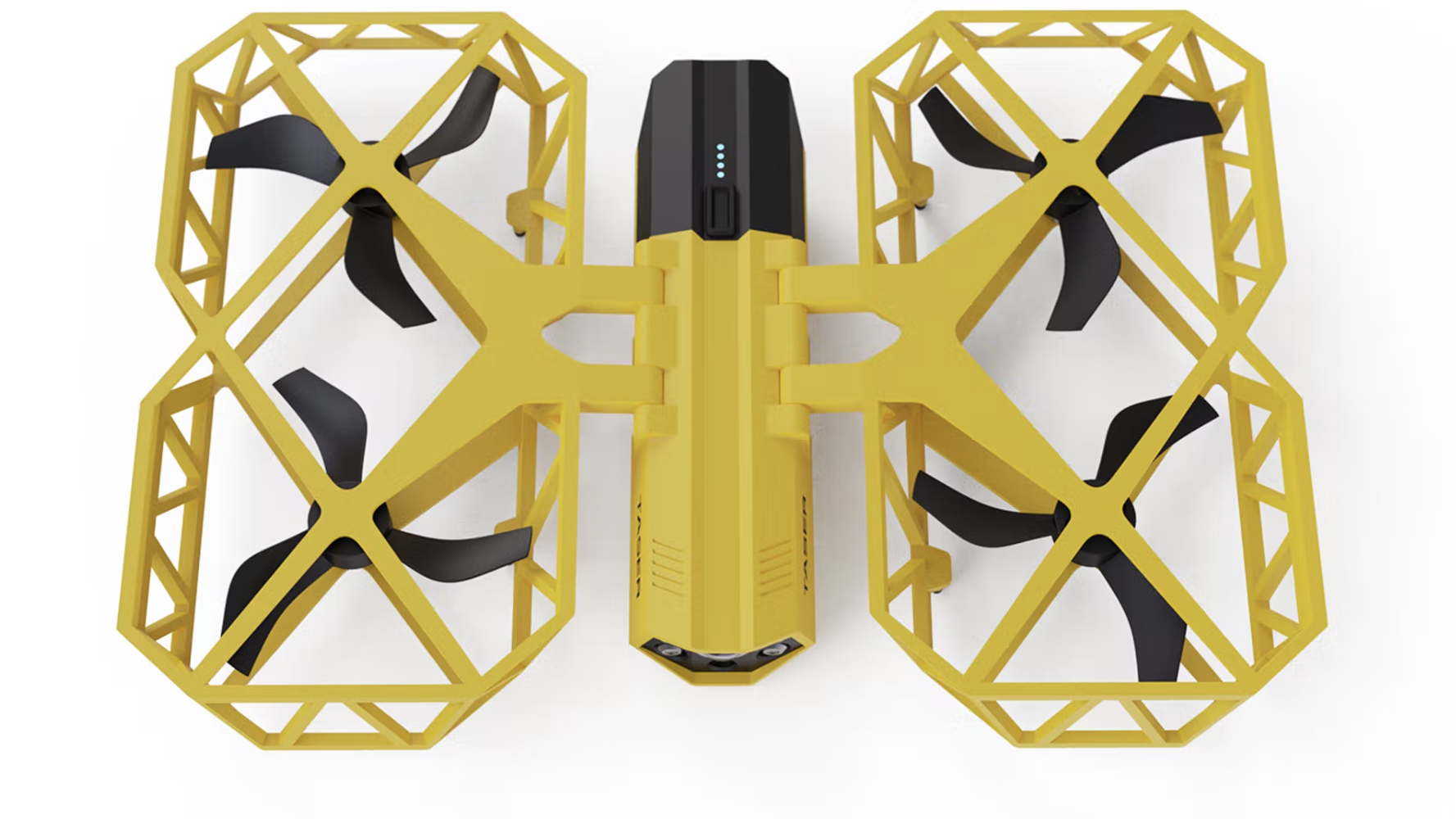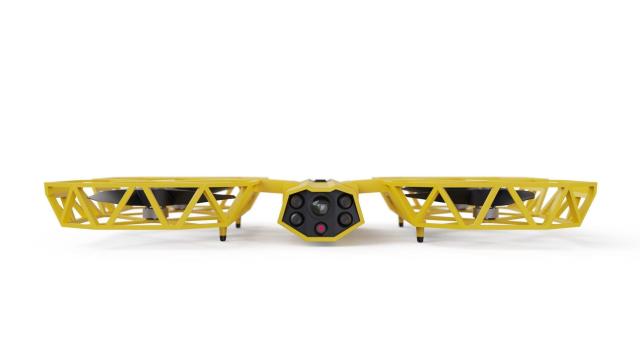Axon, the maker of Tasers, police body cameras, and VR training simulations, wants to add a new buzzy product to its tech policing ecosystem: Taser Drones. While the company believes these shoebox-sized shock machines could potentially save lives during school shootings, privacy and civil liberties groups told Gizmodo they believe the drones may do more harm than good and could be used to brutally suppress protestors and other political dissidents.
Axon floated its idea in a press release this week announcing it had begun formally developing a “non-lethal, remotely-operated TASER drone system.” Rights groups take issue with Axon’s labelling of any Taser products as “non-lethal,” since research shows Tasers have led to the deaths of at least 500 people since 2010. Regardless, when its fully developed, Axon hopes its Taser drone will be capable of deploying and incapacitating an active shooter “in less than 60 seconds.”
“Today, the only viable response to a mass shooter is another person with a gun,” Smith said. “In the aftermath of these events, we get stuck in fruitless debates. We need new and better solutions.”
Smith’s proposed new solution comes while the horror of mass shooters pervades the minds of millions of Americans. Just last week, an 18-year-old shooter in Uvalde Texas murdered 19 children in an elementary school. Local police reportedly waited nearly an hour to intervene. Weeks before that, another shooter in Buffalo, New York killed 10 people in what’s believed to be a racially motivated shooting. Smith first outlined his vision for the drone in his 2019 graphic novel called The End of Killing.
“In brief, non-lethal drones can be installed in schools and other venues and play the same role that sprinklers and other fire suppression tools do for firefighters: preventing a catastrophic event, or at least mitigating its worst effects,” Smith said in a blog post pitching the idea of Taser drones.
In a separate post, Axon founder and CEO Rick Smith laid out three “laws of non-lethal robotics,” which he believes must be met before shipping the drone. Those included a commitment to arm drones with weapons that incapacitate rather than kill, an assurance of human control over a robot’s decisions, and a requirement of rigorous oversight and transparency for participating agencies.
Smith admitted the idea of a flying shock machine might sound “faintly ludicrous to some,” (ya think?) and said the company would engage in a dialogue with the public before shipping any products.
It turns out several of the people who see Axon’s drone program as “ludicrous” actually sit on the company’s own AI Ethics and Advisory board.
Advisory board expresses “serious doubts” about Axon’s commitment to Taser drones
Hours after Axon released its press release, it released a statement from the company’s AI Ethics Advisory Board which expressed “serious concerns” over the drone’s development. According to the statement, the board was presented with the drone concept last. After carefully reviewing the potential benefits and harms — which include the prospect of potentially deploying the drone in over-policed communities of colour — the board last month voted against moving forward with the drone. Axon decided to reveal its drone plans anyways.
“Axon’s decision to announce publicly that it is proceeding with developing TASER-equipped drones and robots to be embedded in schools, and operated by someone other than police, gives us considerable pause,” the board wrote. The board said Axon’s press release represents a “notable expansion” of what was discussed with them and occurred without addressing the boards many outstanding concerns.
In response to today’s announcement… We have included a statement from the Axon AI Ethics Advisory Board. pic.twitter.com/7FDgmImhnU
— Axon (@axon_us) June 2, 2022
One of the board members, University of Virginia professor Danielle Citron, said it was possible some or all the board could resign over Axon’s decision to move forward with a drone without properly consulting the board.
“There’s a lot of disappointment, but a lot of us don’t want to be hasty and lose the chance to have an influence,” Citron told NBC News. “If we all resign, then who’s there?
Smith tried to address the company’s tension with the board on Friday during a Reddit Ask Me Anything session. Responding to a question, Smith said the board was independent and “advisory” in nature, meaning it won’t have a final say over the company’s product decisions.
“We decided that the board would be advisory in nature, and would not have control over the company’s product decisions,” Smith wrote. “The rationale is very simple: the purpose of this board is to bring in police-sceptical view points, and our company makes tools for police. If the board has governing rights over the company, then we would have to make sure the board had a stronger balance of pro-public safety views…which would undermine the very reason for having this advisory board.”
Smith added that the board disagreed with the CEO’s decision to publicise plans around the drone but said he decided to move forward anyway, partly in response to the growing conversation around safety solutions following the recent tear of mass shooting events.
“I could not sit idly by and allow the conversation to happen only internally at Axon,” he wrote.

Civil liberties groups warn of disastrous consequences
The board’s concerns are shared by civil liberties experts who say placing weapons on drones in civilian settings should be a nonstarter.
“Drones should not be armed, period,” Carl Takei, an ACLU Senior Staff Attorney focused on police said in an interview with Gizmodo. “Drones armed with tasers will make it too easy for law enforcement to remotely deploy violence, including at protests and in the Black and Brown communities that already feel the greatest harms from policing.”
In a previous interview with Gizmodo, Takei spoke critically of Axon’s claims around its Taser product and said the mass deployment of those less-lethal weapons have actually increased police use of force generally.
“Police are already too quick to use tasers, and these weapons can kill. Adding tasers to police-operated drones will only make the problem worse,” he added.
Other experts told Gizmodo they feared these types of drones would actually do just the opposite of their stated purpose and potentially put more school children in harm’s way.
“Putting armed drones in schools isn’t public safety, it’s child endangerment,” Surveillance Technology Oversight Project Executive Director Albert Fox Cahn told Gizmodo. “Axon’s PR team claims these dystopian devices are “non-lethal”, but I wonder how long it’ll be before they kill a child with a heart condition.”
Those concerns around safety were echoed by Fight for the Future Director Evan Greer who cited statistics citing hundreds of deaths attributed to Tasers over the past decade.
“There are few people on earth more deplorable than surveillance-software-selling-ambulance-chasers who swoop in after horrific events to peddle their ineffective, invasive, and discriminatory technology,” Greed said. “A world with taser-equipped drones in schools is a world where children are less safe, not more safe.”
Greer and Fox Cahn both warned of a future where these devices could potentially be expanded beyond their intended function and used to potentially punish “misbehaving” students or even political protestors.
“I can’t believe I have to say this, but weaponised drones are not the solution to mass shootings,” Greer added.
Though Axon’s drone remains in a conceptual phase, Smith revealed more details about how his pet project could work during his Ask Me Anything posts. The CEO envisions a future where the drones would exist sprinkled throughout schools and other areas like smoke detectors or placed in hallways or other key areas. Smith also suggested having the drones fly through vents to move “seamlessly between rooms.”
Smith tried to address fears of the drones being co-opted as a tool to suppress protestors. In his post, Smith said Axon’s considering requiring participating agencies have public-facing policies about how their drone would be used and suggested creating a centralised oversight committee made up of civil liberties and public safety experts. Smith suggested Axon could potentially remotely deactivate drones for agencies found to violate Axon’s terms of use. Smith notably did not rule out deploying the drones at protests.
“We could imagine instances where an active shooter or similar shows up at a protest representing a real risk where a remotely operated non-lethal system could be a better choice than today’s alternatives,” Smith wrote.
In a separate response, Smith said he estimated the drone could potentially hit a target from around 12.19 m away and said he believed active shooters would have difficulty shooting down the drones.
Are Taser drones even legal?
It’s also still not completely clear whether or not Axon’s proposed drones would even be legal. Back in 2019, the Federal Aviation Administration issued a warning to the public reminding people that it’s, “illegal to operate a drone with a dangerous weapon attached.” Specifically, the agency said operating drones with weapons attached to them violates Section 363 of the 2018 FAA Reauthorization Act. Violators of that rule are subject to as much as $US25,000 ($34,705) in civil penalties for each violation. The FAA did not immediately respond to Gizmodo’s request for comment on the legality of Axon’s proposed Taser drone.
Police use of potentially lethal drones aren’t entirely new. In 2016, Texas police detonated an explosive attached to a remote-controlled drone to kill a suspect who was exchanging gunfire with law enforcement. Since then, multiple states, including Oregon, Virginia, and Wisconsin, have moved to ban the use of armed drones. Axon’s Taser drone would mark a major acceleration in the field.
“Just a few years ago, the idea of using armed drones in domestic law enforcement was beyond the pale, endorsed by only a single sheriff in Texas,” Takei of the ACLU said.
Rather than solve the problem of mass violence though, experts fear the deployment of these drones in schools would simply heighten the already unyielding sense of fear so many young people already grapple with.
“Axon’s CEO may think that flying robots that electrocute children are the heroes of his graphic novel future, but it would be impossible to invent a more sinister villain,” Fox Cahn said. “If I were in school today, the only thing more terrifying than an armed attacker would be one of these drones.”
